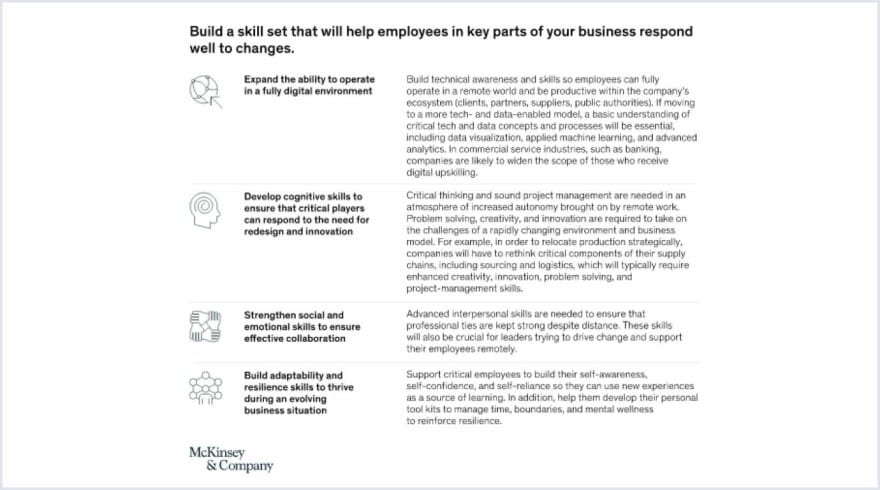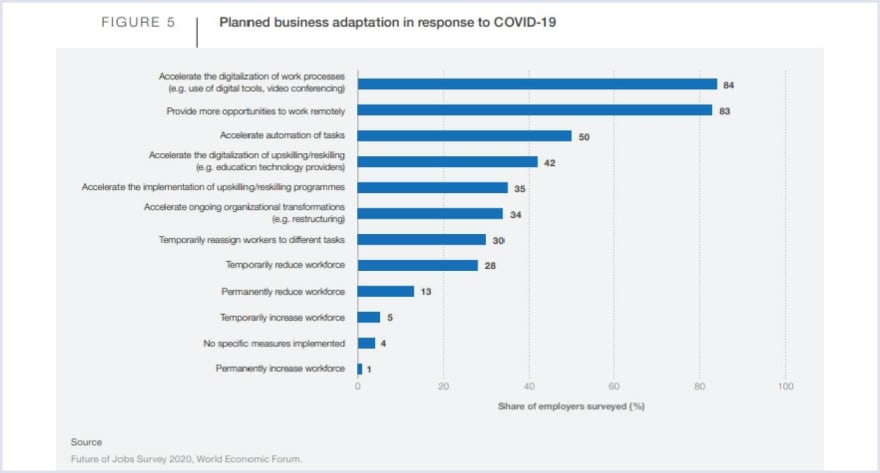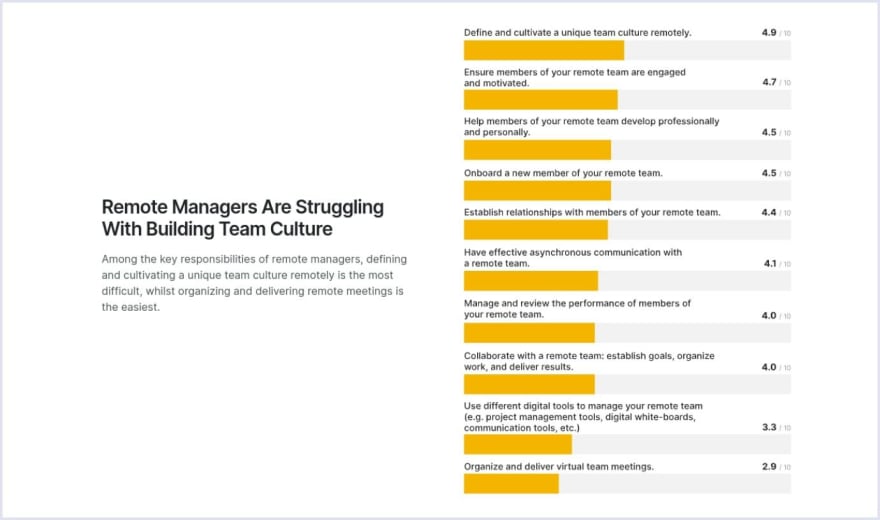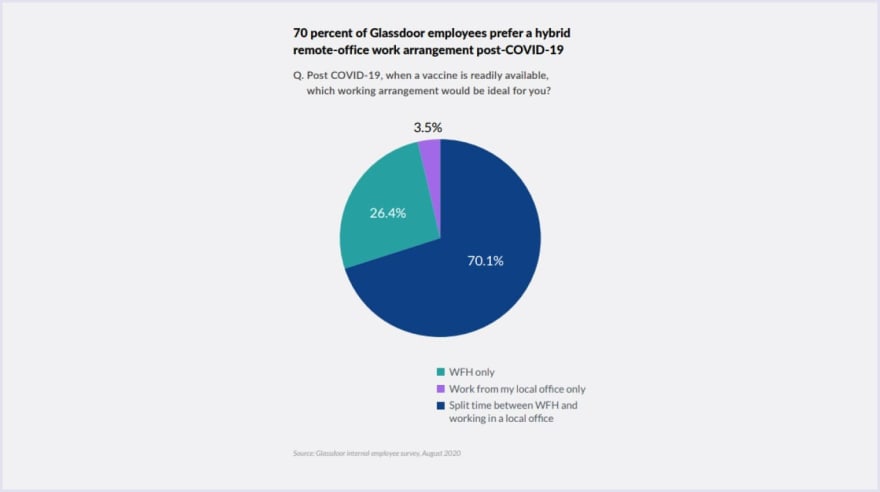The original article was published on Codica blog.
The global shift to working from home can be seen as a major consequence of the Covid-19 outbreak in 2020. However the chances are that companies will not rush to return to the office even when the epidemic goes down.
This article covers the latest trends in remote work that are worth looking at in 2021. Also, we will define why remote working is the future.
Remote working trends vs office work
High demand for telecommuting and cybersecurity tools
The outbreak of Covid-19 made businesses rearrange their priorities. Clear and efficient communication came first. To ensure a transparent working process, companies had to reconsider their communication frameworks. That’s when the search for the right remote work software became a pressing issue.
Organizations started relying on tools such as productivity trackers and video conferencing. Their frequent use became a remarkable remote work technology trend.
The rise of telecommuting tools triggered the demand for advanced cybersecurity. Today apps’ security is of great concern for companies building software-as-a-service applications.
The report by Cisco shows that 85% of the respondents believe that cybersecurity is more crucial now by contrast with the pre-pandemic era.
Moreover, 33% of the organizations that took part in the survey by IDG are planning to invest more time in security management activities in 2021.
Source: IDG
Re-examination of HR practices
The rise of telecommuting had a great impact on the activity of human resource managers. It encouraged them to search for new approaches to perform daily tasks.
To be more specific, they had to adjust to online hiring and onboarding. In this regard, creating a worker’s virtual journey helps them get things done. Also, the HRs need to rethink their performance management and firing practices.
Let’s not forget that human resource managers have to deal with lots of paperwork. On this point, paperwork digitalization as a rising HR remote work trend can save the day. It is aimed at shortening the number of complicated paper-based processes.
Though work from home is beneficial for both employees and employers, it still has some drawbacks. Lack of interaction is considered one of them. To overcome this issue, companies initiate video meetings and so-called online “corridor chats.”
Source: Remote-How
As you can see, the shift to working from home put human resource managers on the verge of a major transformation. Now they have to use new innovative approaches to improve their hiring, training, and firing practices.
The growing need for upskilling and reskilling
Global digitalization has influenced the skills required to perform certain tasks. The sudden transfer to working from home made the demand for upskilling more urgent. We even have specific figures in support of this powerful remote working trend.
Thus, the Future of Jobs Report 2020 shows that over half of employees (54%) will require reskilling by 2022. What has triggered such a remand for upskilling?
Basically, one of the reasons is a recent shift from specific roles towards skills essential for a company. Today the managers’ task is to define a skill set that will help staff members adjust faster and better to the latest changes.
Source: McKinsey & Company
With a view of helping the employees gain vital skills, companies quickly adopt upskilling programs. In addition, internal personnel training becomes a common practice.
The accelerated digitalization of educational programs is gaining momentum now. It is definitely one of the most remarkable work from home trends.
According to the World Economic Forum, 42% of respondents are planning to streamline the digitalization of upskilling. They find it a great way to adjust to the recent changes caused by Covid-19.
Source: World Economic Forum
Transfer to human-oriented organizational culture
We already mentioned the great impact that the pandemic had on the business world. The current situation made them rethink their corporate values too. In this regard, shaping the unique team culture becomes a great challenge for remote managers.
Source: Remote-How
Before the pandemic, companies valued staff performance the most. However, these days worker safety is their serious concern. Such changes resulted in greater flexibility of performance metrics. Consequently, we see the emergence of a new remote work trend, which is people-centric business orientation.
Switching to online work from home caused significant changes in leadership styles. Thus, the ability to build strong communication with remote staff has never been more important. Also, managers need good listening skills. This way, employers can show their staff members that they are valued and make them more engaged.
Remote team: 3 Key Tips
Is telecommuting the future of the business world?
Owing to its undeniable benefits for both employees and employers, telecommuting is here to stay. At least 87% of managers consider working from home to be the future. That’s what the results of the Remote-How survey tell us.
In a similar way, the recent findings by Glassdoor show that 70% of staff members stand out for remote-office work in 2021 and beyond.
Source: Glassdoor
What caused the emergence of such a tendency? Basically, working from home brings both business owners and workers satisfactory results. They include flexibility and cost-effectiveness of business operations.
Let’s take a closer look at the core benefits that work from home brings employees:
- The work schedule becomes more flexible. Life-work balance * is improved significantly.
- Workers no longer need to spend their time on the long-distance commute.
- A home-office environment decreases the stress level.
- When choosing a new employer, location is no longer important.
Now let’s discuss what entrepreneurs can get from work from home:
- Increased productivity of staff members.
- Possibility of hiring required specialists regardless of their location.
- Lower overall business costs and reduced office requirements.
- Fewer sick leaves.
Final thoughts
It becomes clear that working from home will still be there even after the pandemic goes down. It means that businesses need to identify specific pros and cons of telecommuting for their organization. They need to adjust to new realities as fast as possible. Precise focus on the major remote work trends will help them survive in the post-epidemic era.
For more information, check our full article: Work From Home Trends: Future of Remote Working in Post Covid-19 World











Top comments (0)